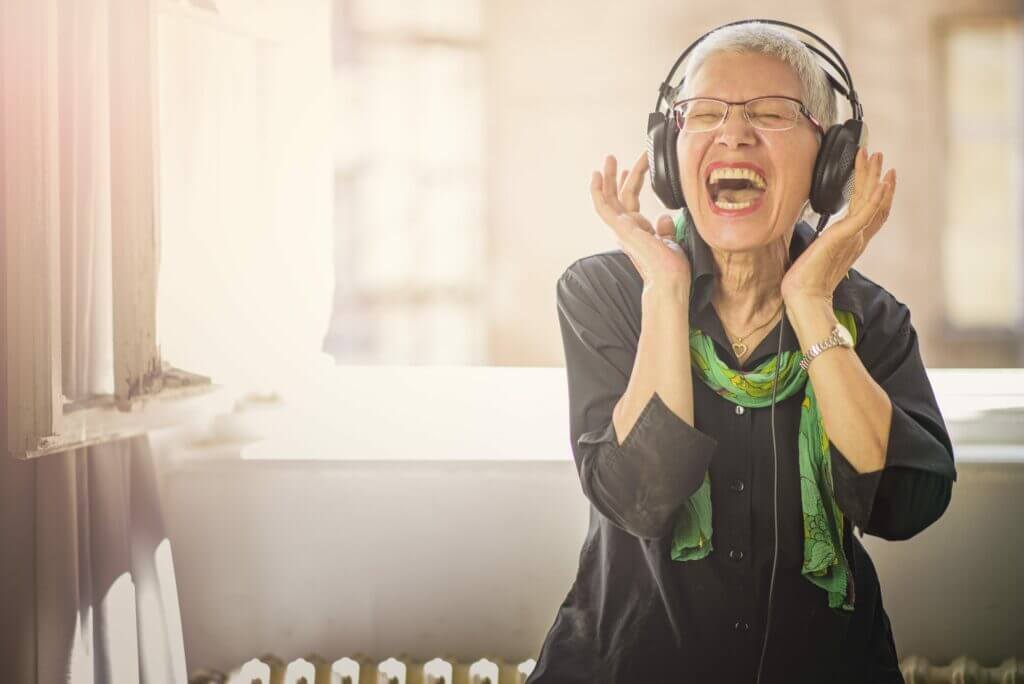Recently, a woman in her mid-fifties said she would like to take part in my singing classes, but it was no use. She was too old to improve her vocal skills with vocal exercises. Bodybuilder legend and actor Arnold Schwarzenegger had a standard answer to such objections when it came to fitness training. If someone said, "I'm too old to work out," his response was, "You're too old not to work out!" In the same way, we should rethink when it comes to singing: as one gets older, the targeted Voice training even more important than before - provided you want to be able to sing into old age.
Signs of age
The signs of ageing of the voice can be daunting. At the age of late forties or early fifties, age-related changes in the vocal apparatus begin and become audible. Affected people report hoarseness, earlier vocal fatigue, airiness of tone, loss of pitch. The signs of vocal ageing have physiological causes. The cartilage of the larynx, including the vocal cartilage (ary cartilage), begins to ossify, the vocal musculature recedes and its neuromuscular control deteriorates (hence often fluctuating tones, involuntary tremolo, etc.). The vocal cords themselves become thinner and stiffer (hence the loss of dynamics and height of the voice), they often bend outwards over time, especially in men (they no longer close properly, hence the airy tones) or form irregularities at the inner edge.
The young-at-heart voice and physical fitness
In the end, the vocal ageing process is inevitable for everyone, but the good news is that there is much to suggest that we can maintain our vocal functions at a high level for longer than many expect. Incidentally, this is also demonstrated by many stars who continue to impress with their singing well into their seventh decade of life, e.g. Tom Jones or Patti LaBelle.
Once again, we can learn an insight from sport: it is not the chronological age, the age in counted years of life, that matters, but the biological age. A chronologically "old" voice can be perceived as much younger because it has remained biologically younger. A singer who is old by years may have kept her voice young by maintaining good general fitness, maintaining a healthy lifestyle and keeping her vocal functions efficient with appropriate exercises all these years.
In fact, general physical fitness is a vital component of vocal performance. The breath is the "power source" of singing, it makes the vocal cords sound. Let's be clear: anatomically, our vocal cords are air-driven oscillators that open and close very quickly to produce sounds (e.g. 512 times a second to sing a high C). Now let's imagine an ageing singer, who has become overweight and runs out of breath after climbing a few flights of stairs. He will find it difficult to sing a song with a high tempo and lots of lyrics, especially if he still has an active voice. Stage performance is added. His shortness of breath impairs the even flow of air for his singing and leads to compensatory muscle tension in the neck, abdomen and tongue. The result is clenching, too much pressure on the vocal cords, and this leads to early vocal fatigue or hoarseness.
For a long-lasting, healthy voice, a good level of fitness is therefore necessary. Regular endurance training such as jogging (or walking), swimming or cycling creates the basis for this. Strength training is also recommended: good body tension, for example, is important for an upright posture when singing.
Vocal fitness programme
At the heart of lifelong singing is a vocal fitness programme that maintains or expands basic vocal functions: Posture, Breathing & Support, resonance of vowels, articulation & text work, Chest and head voice as well as special techniques such as "Twang" or "Belting". You can find out more from other blog posts and from the online singing courses on this website, which are recommended for older and younger people alike.
The daily practice sessions should be short and focused if possible. A rule of thumb is: one third of the time for vocal warm-up, one third for vocalises, Text work etc., one third work on songs. Especially for older people, it is important to vary the exercises in the sessions and to regularly give the voice a day of rest. Regeneration and finding the optimal balance of load and rest time for oneself - that is one of the great secrets of vocal health.
Everyday tips for the longevity of the voice
In order to keep the voice powerful even at an older age, many other pieces of advice for everyday life are being discussed among popular singing teachers.
First and foremost, this includes avoiding habits that damage the voice: Shouting, loud talking, frequent throat clearing or coughing, violent nose blowing and explosive, loud laughter cause injuries to the vocal cords (phonotrauma). Instead, it is advisable to speak at a volume that is appropriate for an arm's length distance from the interlocutor. For singers, it can be beneficial to additionally take breaks for the voice during the day ("vocal naps"). Such a phase of complete silence can be mentally and physically refreshing.
People who sing need a lot of liquid, preferably Water. It is true that the water does not come into direct contact with the vocal cords when we drink it (otherwise we would have to cough). But in the amount of 2-3 litres a day, it provides a systemic water supply for our body, which also keeps our oral mucous membranes and vocal cords well moistened and fresh. Studies have shown that singers can sing more effortlessly this way. In addition, it is helpful to avoid foods and medications that have a dehydrating effect on the voice, such as coffee or black tea - caffeine has a dehydrating effect.
Alcohol also has a systemic dehydrating effect, but even more important is that the acid in alcohol increases the risk of acid reflux. Acid in the stomach, which penetrates into the larynx during belching or sleep, is a widely underestimated cause of vocal problems. Typical symptoms are: a worse voice in the morning after waking up, "frog" in the throat, loss of high pitched voice, faster vocal fatigue, a sour, brackish taste in the mouth. If acid reflux is suspected, a doctor should be consulted. If necessary, acid-inhibiting medicines are indicated, alkaline foods are to be preferred, and generally the following applies: When we go to bed, the last meal should be about three hours ago.
Nicotine and tobacco should not be overlooked when it comes to stimulants that we should avoid. It is well known that tobacco is a common cause of laryngeal cancer. But what many people don't realise is that the heat from a cigarette is so far above the boiling point that it damages the vocal cords quite directly - this becomes audible early on in the "smoker's voice". The same applies to cannabis.
Medical help
Many people have undiscovered or untreated allergies. Hay fever, but also some food allergies, lead to a chronic irritation of the airways that can affect the voice. Here, a medical diagnosis and treatment is worthwhile.
What affects older people in any case: hormonal changes. The drop in testosterone levels in men and the lower oestrogen levels in women after the menopause have an impact on the voice. A medical examination may be indicated here, possibly also hormone replacement therapy (with conscientious weighing of benefits and risks, such as an increased risk of cancer). Changes in thyroid function deserve special attention here, as they are often accompanied by vocal changes such as a reduced vocal range or a dull vocal sound.
For some people with age-related voice damage, surgery is recommended - for example, if the vocal cords are bent so far outwards that they no longer close. Combining the operation with voice therapy exercises has then proven successful in many cases to regain voice functions. Before surgery, however, a thorough medical diagnosis is required, through a video-assisted stroboscopic examination of the larynx.
The good news
In summary, despite the inevitability of ageing, the voice can be kept young for many decades. With a healthy lifestyle, good nutrition, an endurance-trained cardiovascular system and medical care. And of course with the right vocal exercises. So that singing is still fun in old age.
I hope this article has encouraged you to take action. In my online singing courses, you will learn about important tools for building your voice.






